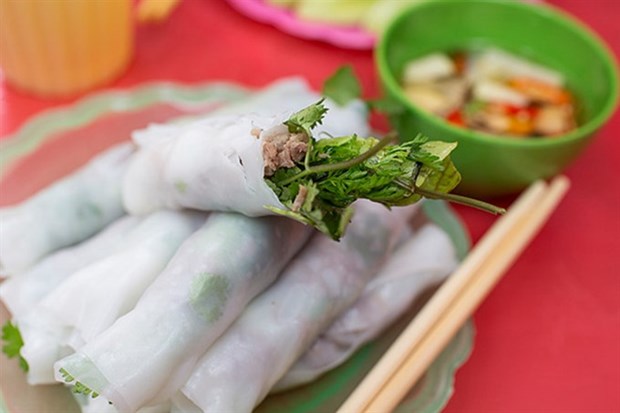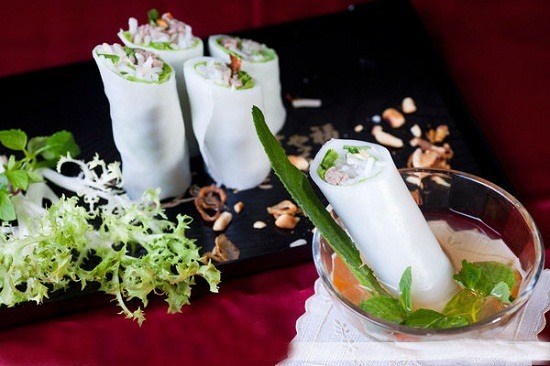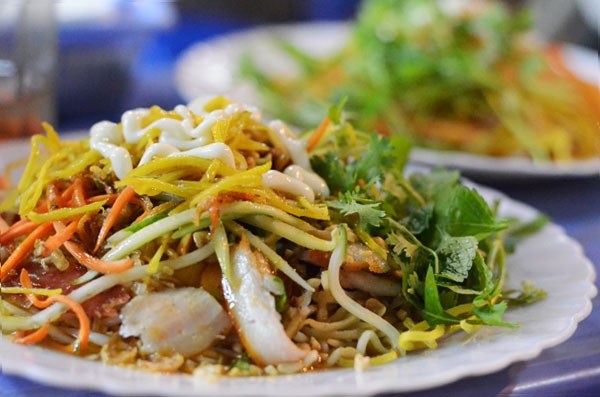An unusual feature of Vietnamese cuisine is the ownership that people – chefs, restaurant owners, gourmets or just the “common man” – display for a dish, and the stories that they are prepared to share.

Can’t have enough: You can eat a lot of pho cuon (rolled pho) and then eat some more. — Photo: Doan Tung/VNS
These
stories may or may not overlap, and may even contradict each other, but they
never fail to add some spice to the dish that is already tickling our palate.
In
that spirit, meet 70-year-old Hoang Thi Xuan, a sprightly senior from the
erstwhile village of Ngu Xa in Ha Noi, who used to sell noodle soup before one
eventful night, many years ago, when necessity mothered an invention.
That
night, she was about to close her noodle soup shop when a group of men came in
and requested a bowl of pho each.
“I
was very confused, because the men were regular and close customers. I wanted
to say sorry, because it was too late and that I had run out of the broth. All
I had was some uncut rice noodles and boiled beef.
“But,
seeing that the men were really hungry, I decided to improvise. I wrapped the
rice noodles with beef and dill and made a dipping sauce with vinegar, fish
sauce, garlic and chilli, which are always there in the shop.
“To
my great surprise, my customers heaped praise on me, saying the dish was so
good that they would return for I the next night after watching a World Cup
football match.”
Since
then, Xuan said, she began making pho
cuon, which sold so well that she stopped selling noodle soup.
There
may be a similar story about yet another dish that the capital city has become
famous for, pho chua (sour noodle),
but we can be confident one will emerge sooner or later.
These
two dishes have become star attractions in their own right, giving company to
the exalted, iconic pho (noodle soup)
that the capital city is justly famous for.
Pho cuon
Ngu
Xa, located near the Truc Bach Lake, was once a craft village dedicated to
bronze casting, but its current claim to fame is the pho cuon street in Ha Noi’s Ba Dinh District.
Xuan
said that after she stopped selling noodle soup and shifted to her new dish, a
dozen neighbours began doing it too, but “we still cannot meet the increasing
demand, particularly in summer, because during the hot weather, pho cuon helps to cool down the heat
inside the body”.
She
said pho cuon shops are typically
very crowded weekends and late afternoons.
“At
these times, all my four workers have to work very hard to serve our customers.
Each skilled worker can wrap 30-40 pho
cuon in two minutes.
“I
have to choose quality rice from Nam Dinh Province’s Hai Hau District, get
organic beef from a farm in Ba Vi and use clean fresh vegetables like lettuce,
coriander and Lang basil so that the customer gets safe, tasty food.”
Xuan
also said that the rice noodle sheets used must be made as thin as possible,
and be a bit crispy to the same time to ensure that the roll is not shrivelled.
Ho
Thi Ty of Nghe An recalled the first time she was in Ha Noi: “It was the first
time I had pho cuon. I cannot
describe how tasty it was! The pho
was thin, the beef fatty and soft and delicious while the dill, the Lang basil
and cilantro added their own flavours and fragrances. I ate a lot, but could
not have enough.
“I’ve
also got the recipe, so I can make it at home. I’m surely that my family,
including my grandparents, will love it.”
Pho chua
Pho chua (sour noodles) is said to have
originated in the northern province of Lang Son. The credit for bringing the
tasty, aromatic dish to the capital city several decades ago is claimed by To
Van Dinh, a native of Lang Son Town.
Dinh
says the dish came into being a very long time ago in his native place. His
mother sold it at the Ky Lua Market there.
“All
my five family members joined mother in cooking the dish because it has many
ingredients and the cooking is a complicated process, such as making the rice
noodles.”
The
dish comprises rice noodles, fried sweet potato, roasted pork, fried ground
nuts, carrots and cucumber. Preparing all these is a lot of work, Dinh said.
But,
he added, the key to this dish being tasty or not is the sauce, a mix of
tamarind juice, garlic, chili, honey and several other ingredients.
“The
dish gets much more enjoyable when diners toss the sauce well with the pho,” said Dinh.
Herbalist
Nguyen Van Vien of the Ha Noi Hospital of Traditional Medicine, said pho chua helps people with digestion and
reduces hypertension. It is very good dish to have in summer, and a bowl of pho chua is rich in protein and
different vitamins, he said.
Dinh
recalled that his two younger brothers would not anything except pho chua when
growing up. “They would resist and reject everything else, but not the aroma of
this dish.”

Can’t have enough: You can eat a lot of Pho cuon (rolled pho) and then eat some more.

Refreshing: Pho chua (sour pho) is perhaps the dish to enjoy in summer. — Photos monngonhanoi.vn
By Ha Nguyen/
VNS